6 Tips To Help Your Special Needs Child Make Friends

- You can help your special needs child make friends with other children by joining playgroups, visiting the library, or checking out local organizations.
- Forming friendships with other children is essential because it aids in social development, emotional support, and a sense of belonging among their peers.
- Consider your child’s disability as you introduce them to new environments, and understand that it may take time for them to feel comfortable in certain situations.
Making new friends can be challenging for anyone (even adults!), but if your child has special needs hindering their ability to form friendships with another child, you may need to provide guidance.
As a mom, seeing your child struggle to make friends is heartbreaking because you want them to feel accepted by other kids. You want them to find their person.
While being popular doesn’t matter, every child deserves one great friend. For example, my oldest son will play with almost anyone, but he has one friend he always goes back to, and I love their sweet friendship.
A special needs child’s friendships with their peers can significantly impact their life and ability to socialize with others. Let’s look at ways you can help your special needs child form friendships, learn to play well with others, and have fun when they hang out with other children their age.
1. Foster Social Skills Through Play
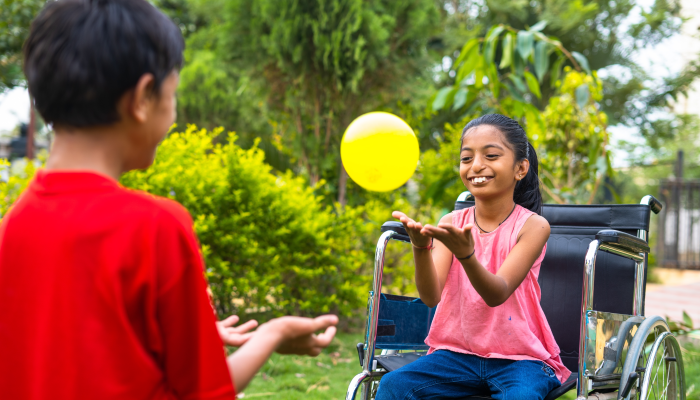
One of the best ways to help your child form future friendships is to teach them basic social skills like sharing, taking turns, and empathy. It doesn’t come naturally for some kids, so you can try fostering specific skills through playing.
For example, you can spend extra time playing activities at home where you practice taking turns with a toy to show your child the best ways to engage with their peers.
In addition, you can schedule structured playdates with explicit activities and goals, so your child isn’t surprised by where they are going and what they will do when they get there.
2. Create Opportunities for Regular Social Interaction
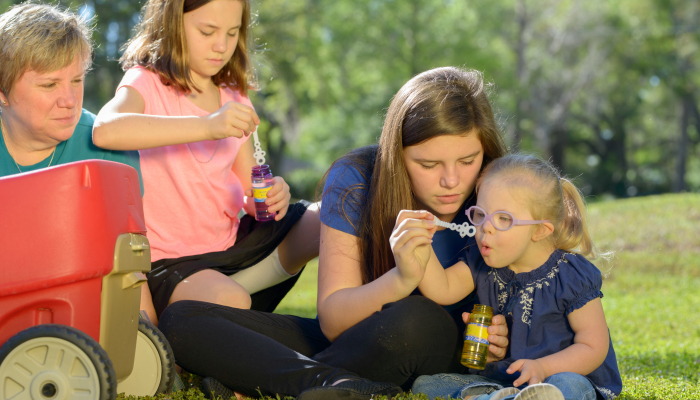
It’s so important to have regular social interaction to help your child become comfortable with other children and fellow students.
Here’s a list of ideas to help encourage social interaction for special needs children:
- Join a local moms’ group (i.e., MOMS Club or MOPS).
- Visit the library for storytime.
- Go to the park.
- Use social media to find events in your community.
- Check out Be Like Buddy to find sensory-friendly and autism-friendly events in your state.
- Participate in Special Olympics programs.
Consider gradually increasing the duration and complexity of social interactions, allowing time for your child to adjust. If your child is easily overwhelmed, you’ll likely want to visit places like the library or park in the morning when it’s not as busy.
As time passes, they may want to spend time independently with their new friends, with you as a shadow in the background. As parents, we quickly want to jump in if we see our children struggling, but sometimes, letting them stumble a little helps them grow into the person they are meant to be.
3. Collaborate with Educators and Therapists
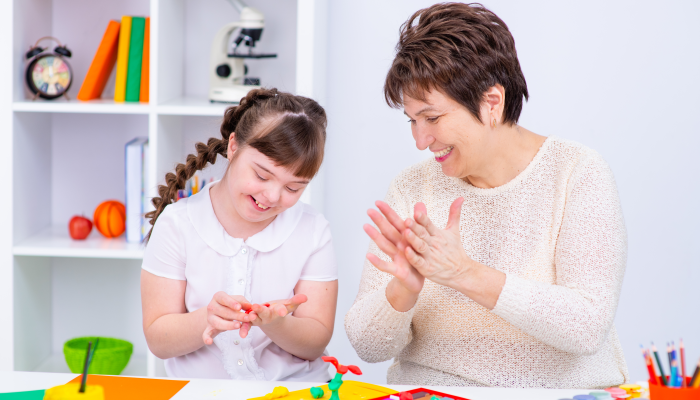
Don’t hesitate to get your child’s educators and therapists involved in ideas for providing support services and socialization strategies to help develop a new friendship. Your child’s teacher is a great first-hand witness to how they interact with other students, and they can let you know where they struggle most.
For example, maybe your child doesn’t like to go up to another child on their own and needs encouragement. You can use that information and guide them as they interact with other children at the playground or library.
You may also want to meet with your child’s teacher to discuss social goals and how they can be integrated into your child’s education plan. If your child has a specific disability, see if there is a school program they can participate in to foster their unique needs.
4. Encourage Empathy and Emotional Intelligence

Another great thing you can do for your child is to encourage empathy and emotional intelligence, particularly in forming deep and meaningful friendships. If your child struggles with this, provide strategies for teaching them to recognize and respond to others’ emotions.
Remember to include your family while promoting and expressing feelings through games and other activities. For example, you can act out different scenarios where each family member responds differently, which can become a fun game!
5. Leverage Technology and Apps for Social Learning
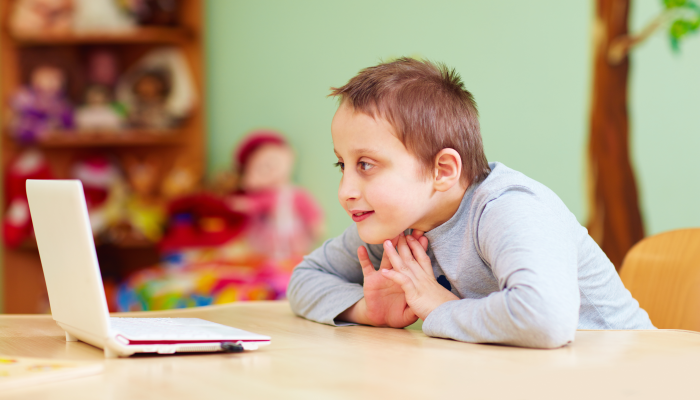
When in doubt, don’t hesitate to turn to technology. While no parent wants to rely solely on a screen, it can help enhance social skills in a fun, interactive way.
There are plenty of indoor activities for kids with disabilities including the following social learning apps:
As parents, it’s important to remember to choose developmentally appropriate apps and limit screen time11. Screen Time and Children. The American Academy of Child and Adolescent Psychiatry. 2020. https://www.aacap.org/AACAP/Families_and_Youth/Facts_for_Families/FFF-Guide/Children-And-Watching-TV-054.aspx depending on your child’s age.
6. Teach Coping Strategies for Social Challenges

It’s important to remember that your child may have difficulty in social situations, so teaching coping strategies is an excellent way for them to deal with rejection or misunderstandings.
Unfortunately, not all social interactions will be positive, so understanding social anxiety in special needs kids is important as well as going at your child’s pace.
You also want to emphasize resilience and the importance of trying again. If your child had an uncomfortable experience, talk to them about how well they did and what can help make the next time better. After you’ve talked, consider writing down your child’s thoughts so you don’t forget how they felt.
FAQs
Can speech therapy improve social interactions and future friendships for children with speech delays?
Speech therapy can help improve social interactions for kids with speech delays and with making friends in the following ways:
- Understanding social cues from fellow students
- Improving communication skills with other children
- Building confidence around other kids
- Peer interaction opportunities
- Practicing social scenarios with children of similar ages
How do I find inclusive extracurricular activities for my child with special needs that encourage friendships with other children?
One of your best bets for finding inclusive extracurricular activities is contacting local organizations or using online resources. For example, you can use social media to find local events specific to your child’s interests or disability, which may help them form bonds with friends of similar backgrounds and the same age.
What are the best strategies for dealing with bullying for children with severe disabilities?
Bullying is one of the most challenging things we deal with in life as parents, but how do you handle it if your child with disabilities is being bullied? Here are a few strategies:
- Speak to the administration of your child’s school to discuss the situation and determine a plan of action.
- Encourage your child to communicate openly with you about what is happening at school, allowing them to feel comfortable sharing their concerns and emotions.
- Monitor and document incidents, including changes in your child’s behavior, mood, or academic performance.
- Remind your child that bullying is unacceptable, and help them understand what constitutes bullying.
Stopbullying.gov is an excellent resource for parents, children, and school staff on preventing and responding to bullying. If another kid is bullying your child, you shouldn’t wait to see where the situation leads, and always inform the school of inappropriate behavior.
References
- Screen Time and Children. The American Academy of Child and Adolescent Psychiatry. (2020, February). https://www.aacap.org/AACAP/Families_and_Youth/Facts_for_Families/FFF-Guide/Children-And-Watching-TV-054.aspx
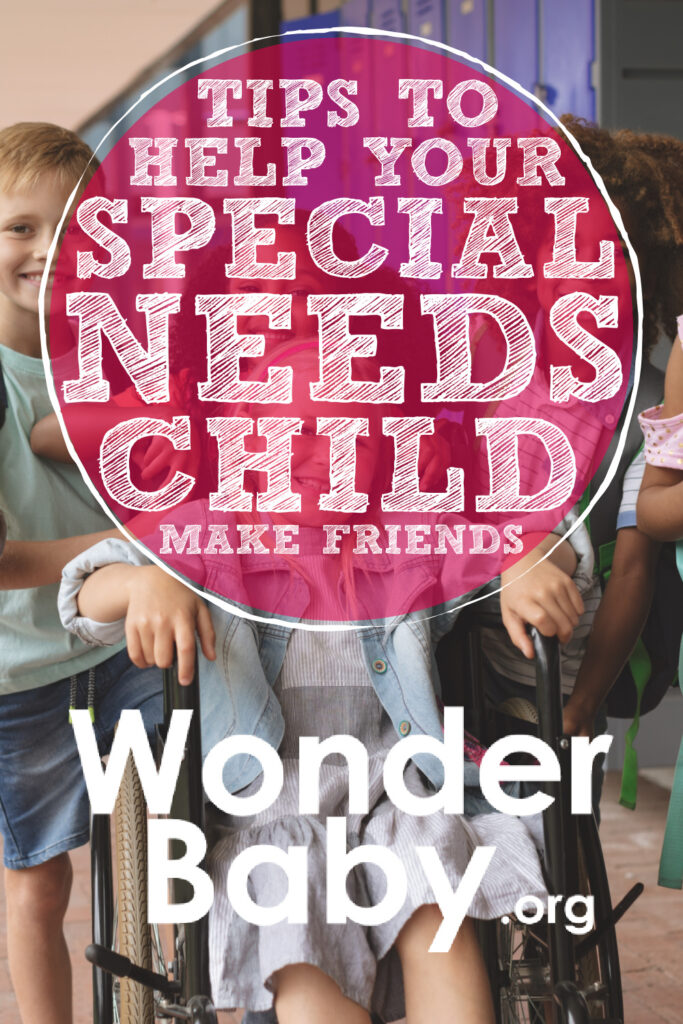
Related Posts

Eye Conditions and Syndromes, Visual Impairment
Neuralink Announces Plans to Restore Sight to the Blind with Brain Chip
Elon Musk’s company Neuralink has announced plans to begin human trials of its new “Blindsight” brain chip by the end of 2025.

Special Needs
5 Spring Cleaning Tips for Families of Children with Disabilities
Spring cleaning is an opportunity to create a more accessible, organized, and supportive space for your child with disabilities. Declutter, deep clean, and refresh!

Visual Impairment
The Gift of Understanding: How a Young Child Helps His Blind Father Navigate Life
When a parent is blind, it’s natural for people to wonder how their sighted child will adapt. Will they struggle to understand their parent’s needs? Will they feel burdened by...